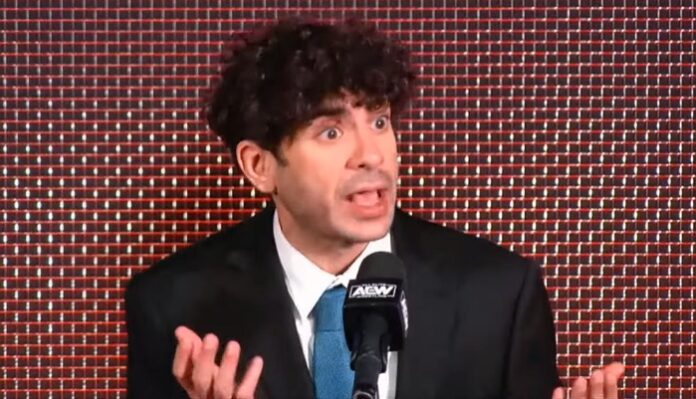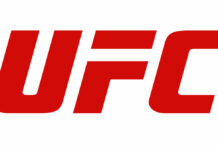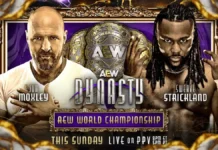
On the heels of the Tuesday night ratings clash, a sample size that proves nothing that isn’t already apparent in the grand scheme of things, the tribalism among the often-jaded sports entertainment fan base is even more obvious than usual. It’s the flip side of the diehard and passionate audience that invest in the characters of professional wrestling, the fans that will remember legends of the past with the proper appreciation for their contributions will be the same demographic that will spew pettiness on social media. In truth, either extreme, as is usually the case with most things, is misguided. There are those that have been programmed for the past few decades to believe that anything without the WWE logo is subpar pro wrestling, a narrative that the company created through its spin of the history of the industry in countless documentaries over the years. At the same time, there are those that will automatically be contrarian because they assume that it proves their “knowledge” so anything the WWE does is labeled as underwhelming in an attempt to avoid giving credit to the corporate machine.
It might not be as polarizing as a Meltzer report, as bias as he can sometimes before, or dodge as much criticism as a Bischoff podcast clip, but the entire AEW/WWE competition is apples to oranges.
The two groups might be in a similar genre, but their goals within that context are completely different. The easiest way to say it is that All Elite attempts to sell professional wrestling to that specific demographic, while the WWE tries to sell sports entertainment to the casual fan base. There’s nothing wrong with that either, and theoretically, that’s a very wise strategy for the Khan-owned organization. Nobody has or ever will produce a better sports entertainment show than the state-of-the-art WWE crew. That’s not a knock on any other group either, but rather to point out that the WWE has over forty years of production to draw from to be able to present their shows exactly how they want to the public. The lighting, the video packages, the camera work, and several other aspects are carefully designed to garner the signature WWE style.
It would be unfair to expect a group with only a few years of television behind them to be comparable to decades of experience, and that’s why its smart for All Elite to try to establish its own presentation rather than something that resembles WWE-lite, especially since that was one of the many mistakes that doomed TNA to mediocrity.
Furthermore, the extended existence of the WWE and the cache that goes along with that are also something that an upstart organization can’t have because by definition, it takes years to establish that type of brand awareness. Again, that’s not a jab, but rather to point out that it really is an apples to oranges comparison. The brand of Wrestlemania sells tens of thousands of tickets every year before a card is announced because of the history and the prestige of the event, but again there’s a track record of almost 40 years that established the name value of the pay-per-view. It’s unfair to attempt to evaluate AEW by that standard since the company has existed an exponentially shorter amount of time than the WWE.
The big picture goals for both organizations are different, even if there’s some common ground. Yes, the modern era brings with it a focus on television rights fees and ad revenue, which is a dynamic that emerged after the expansion of media distribution in recent years. With so many options competing for viewers online and through traditional platforms, advertisers attempt to make sure that their products get in front of the target demographic so they are willing to pay for commercials on shows that have a consistent and steady audience. When an advertiser decides to buy ads for Raw, they know roughly how many viewers on any given week will see their products and then there’s the opportunity to sell to those potential customers. That’s why those steady and consistent numbers, even if they are lower than in the past, are valuable to networks and sponsors because it’s a safe investment.
That being said, WWE is a part of a $21.9 billion corporate merger with the UFC, and that’s a scale that is completely different than a traditional pro wrestling company. Tony Khan must look to book a solid television show to secure those previously mentioned consistent ratings to continue to get paid hefty cash for another TV deal with WB Discovery, and it looks like the network approves of the ratings that the AEW shows bring their channels. As of now with All Elite pay-per-views still being traditionally distributed, the other major piece of the puzzle for Khan is to book PPVs that the diehard fan base will pay $50 to watch. Reportedly, the PPV number have done well and are profitable.
On the flip side, the TKO group will look to keep the stock price strong, which a completely different situation, as its designed to serve the shareholders, not necessarily the fan base. It was a difficult balancing act for WWE brass in the past, but with the additional media muscle of the UFC, it’s much easier for the corporation to work for both purposes as far as Wall Street and the paying audience.
That’s the biggest divide between AEW and WWE, one is a pro wrestling group that is trying to secure a television deal, move tickets, and sell pay-per-views. The other is a sports entertainment conglomerate that uses its brand awareness, media properties, and extensive resources to secure massive TV rights, corporate sponsorships, and a strong stock price.
Then I wasn't talking to you.
And you don't even follow me, so why reply? pic.twitter.com/8dGa8wmoBp
— Tony Khan (@TonyKhan) October 11, 2023
Yes, the WWE has the dominate market share, and yes, AEW is the secondary company, but that doesn’t mean that All Elite can’t be successful. I’ve said this several times, but revenue and profitability are the true barometer of success. The concept of head-to-head competition between WWE and AEW is almost laughable because again, it’s apples to oranges. As much as Tony Khan wants to try to recreate WCW-level competition, it’s not realistic. The goal for All Elite should be profit, not competition to Vince McMahon.
Actually I'm pretty sure that last night blew whatever chance he had at winning that award.
— Tony Khan (@TonyKhan) October 11, 2023
That’s why Tony Khan’s recent tweets are so foolish and misguided. Tony replied to fans that criticized the product and then tweeted about the “booker of the year” award from The Wrestling Observer. Does winning the “booker of the year” from Dave Meltzer actually sell any tickets or pay-per-views? If not, it shouldn’t be on Khan’s list of priorities. Quite frankly, Khan should be more concerned with what sells tickets and pay-per-views, not what impressive Meltzer. That’s not even meant as a knock against the editor of The Observer; but rather to point out how narrow-minded Khan appears to be. Clearly, Khan wants to be comparable to Triple H or another members of WWE management. Would Triple H argue with a random troll on Twitter?
The biggest takeaway from the Tuesday night head-to-head broadcast is that Tony Khan should realize that his priority should be drawing money, not trying to win “booker of the year” from The Observer or attempting to recreate the Monday night wars.
What do you think? Share your thoughts, opinions, feedback, and anything else that was raised on Twitter @PWMania and Facebook.com/PWMania.
Until next week
-Jim LaMotta
E mail [email protected] | You can follow me on Instagram, Facebook, & Threads @jimlamotta89







